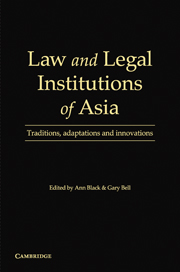5 - Korea
Bridging the gap between Korean substance and Western form
Published online by Cambridge University Press: 01 June 2011
Summary
Introduction
The Republic of Korea (hereinafter Korea), commonly called South Korea as opposed to North Korea, is a highly homogeneous, yet intensely dynamic nation. Located in East Asia on the southern half of the Korean peninsula, and neighboured by China to the west and Japan to the east, Korea has a population of over 48 million people in a territory of just 100,032 square kilometres, which is similar to the size of Portugal. As two-thirds of the land is mountainous terrain, Korea is one of the most densely populated countries in the world. Along with this high population density, Korea's ethnic and lingual make-up renders it a highly homogeneous nation. At the same time, Korea has experienced continuous ups and downs throughout its modern history, and has made considerable efforts to respond to each and every challenge in a timely manner. This has resulted in Korea's high level of dynamism. It can be seen in the dramatic changes that have occurred in the Korean economy and politics. Korea was once one of the poorest nations in the world. This was so following the devastating Korean War (1950–53), yet the nation miraculously grew to become the 15th strongest economy in the world in terms of gross domestic product (GDP) in 2008. Although the Korean economy had to face numerous crises, including the so-called IMF (International Monetary Fund) crisis of 1997 that impacted not only upon Korea but also upon other Asian countries, and the global financial crisis of 2007 which originated from the US liquidity crisis, Korea successfully maintained its status as an ‘economic miracle’.
- Type
- Chapter
- Information
- Law and Legal Institutions of AsiaTraditions, Adaptations and Innovations, pp. 151 - 184Publisher: Cambridge University PressPrint publication year: 2011
References
- 2
- Cited by



